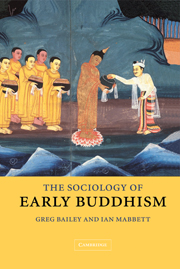Book contents
- Frontmatter
- Contents
- Acknowledgements
- List of abbreviations
- Introduction
- 1 The problem: asceticism and urban life
- CONTEXT
- MEDIATION
- 7 The holy man
- 8 Preparation of the monk for the mediatory role. Evidence from the Sutta Nipāta
- 9 The Dhammapada and the images of the bhikkhu
- 10 The mediating role as shown in the Canon
- 11 Exchange
- Conclusion
- Bibliography
- Index
7 - The holy man
Published online by Cambridge University Press: 22 September 2009
- Frontmatter
- Contents
- Acknowledgements
- List of abbreviations
- Introduction
- 1 The problem: asceticism and urban life
- CONTEXT
- MEDIATION
- 7 The holy man
- 8 Preparation of the monk for the mediatory role. Evidence from the Sutta Nipāta
- 9 The Dhammapada and the images of the bhikkhu
- 10 The mediating role as shown in the Canon
- 11 Exchange
- Conclusion
- Bibliography
- Index
Summary
On the working hypothesis adopted here, the Buddha taught that truth is best to be found by leading the life of a wanderer who rids himself of all attachments and cultivates an austerely simple way of life, cut off from all social ties and possessions and following the path by which the causes of suffering and rebirth can be destroyed. This original idea is not to be regarded as determining a particular defined stage of Buddhism as a whole; it is, rather, one of a number of factors that co-operated in the shaping of the movement when the Buddha began to communicate his ideas to others. Nevertheless, the idea was original and basic, and it persisted, clearly and unambiguously, in the scriptures. It must therefore have been an element in the success of Buddhism in a particular sort of social environment. The purpose of this chapter is to advance a substantially new view of the way in which Buddhism (and similar ascetic movements) could first come to secure an important social role. This interpretation requires us to acknowledge that the life of the wandering ascetic was the original ideal of the Buddhist Order, and the one by which (despite its austerity and other-worldliness) it was first able to attract substantial support in some areas. First, therefore, it is necessary to survey briefly the reasons for accepting that the original impulse driving the order was indeed an ascetic one.
- Type
- Chapter
- Information
- The Sociology of Early Buddhism , pp. 161 - 183Publisher: Cambridge University PressPrint publication year: 2003



